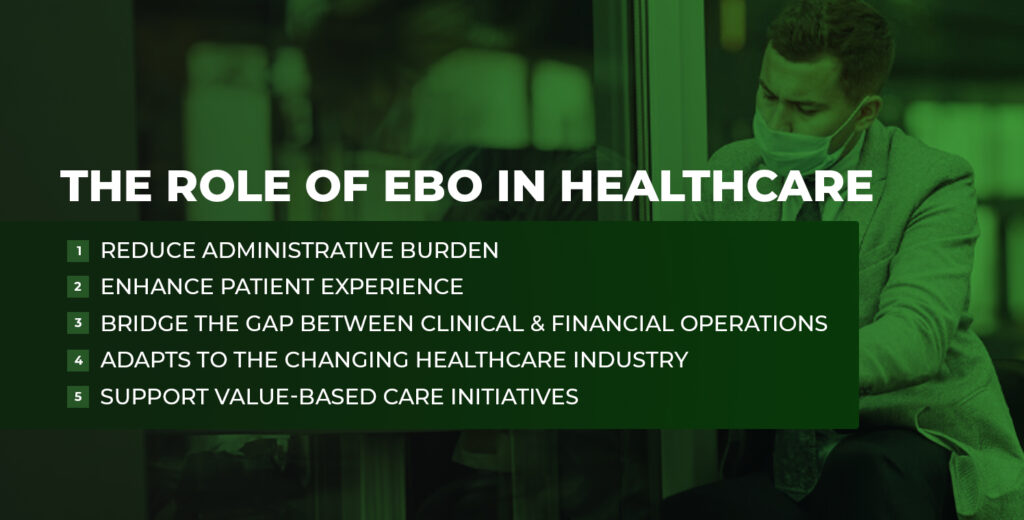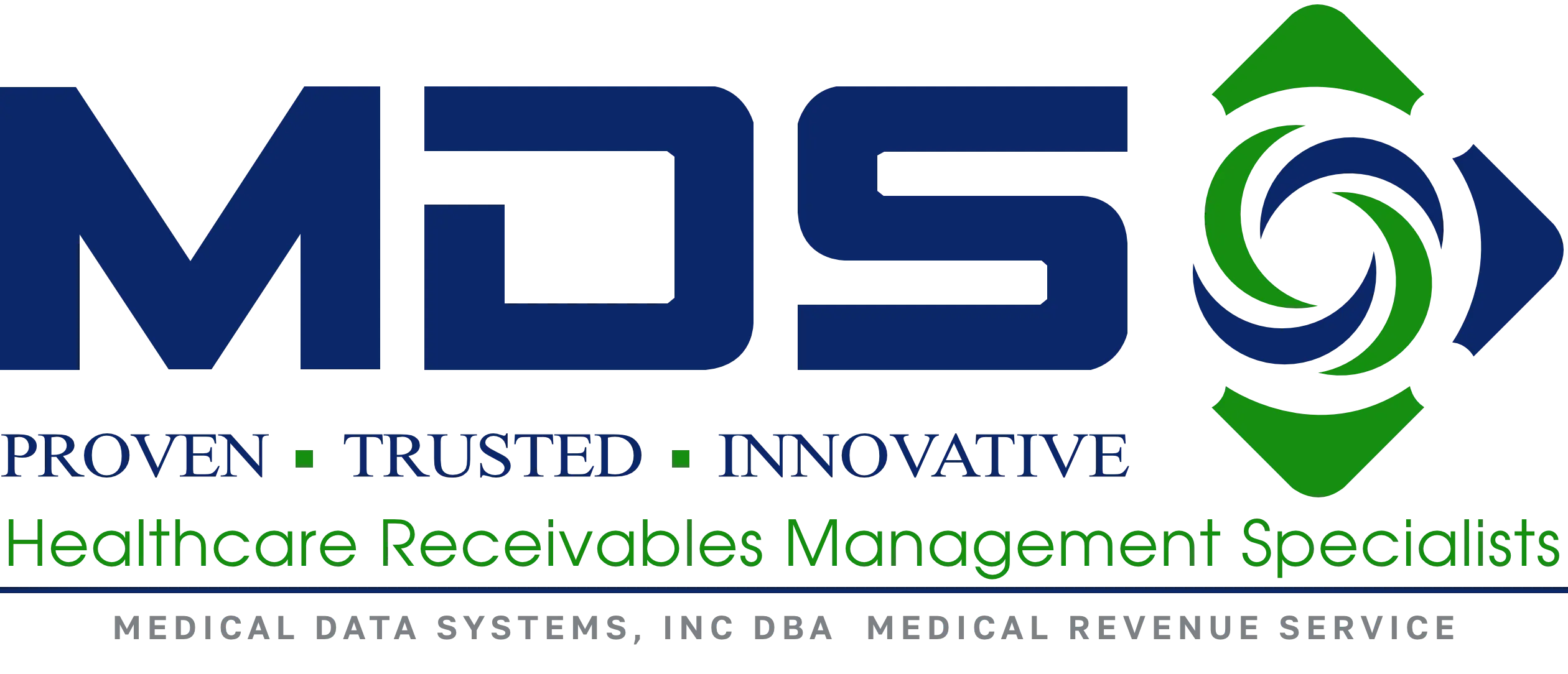Did you know that healthcare providers lose an estimated $125 billion annually due to inefficient billing and administrative processes? Managing a successful healthcare practice goes far beyond patient care. It mainly requires delving into a complex maze of insurance claims, payment collections, and regulatory compliance. As your practice grows, so do the challenges of managing the revenue cycle.
If this is your scenario, there’s a powerful solution designed to ease this strain, i.e., an Extended Business Office (EBO). In our last blog, we already talked about the definition and importance of an EBO. Let’s now understand how an EBO can optimize your healthcare operations, boost financial performance, and create a smoother patient experience while allowing you to focus on providing quality care.
What Does an EBO Do For You?
An Extended Business Office serves as an external partner to manage critical financial tasks that can overwhelm your in-house team. Essentially, it’s a comprehensive extension of your healthcare practice’s financial operations. To speak in detail, it goes beyond basic billing support, offering a full suite of business office solutions that streamline your processes and keep your practice running smoothly.
Hence, whether it’s handling claims, patient follow-ups, or revenue reconciliation, an EBO can help to offload the non-clinical but crucial administrative tasks that bog down your healthcare practice.
Core Functions of an EBO

At its core, an EBO operates as an offsite extension of your business office, delivering a variety of critical services, including:
- Revenue Cycle Management: From patient registration to final bill payment, an EBO manages the entire process, ensuring accurate claims, submissions and follow-ups.
- Accounts Receivable Management: An EBO can help you bid goodbye to uncollected patient balances by tracking unpaid bills and managing collections.
- Reporting & Analytics: Through in-depth reporting and performance analysis, an EBO provides insights into your financial health and identifies areas for improvement.
Why Might You Need An EBO in Healthcare?
The complexities of the healthcare revenue cycle, coupled with increasing regulations and patient expectations, make managing in-house operations challenging for many providers. Here’s why you might need an Extended Business Office in healthcare:
- Challenges in the Healthcare Revenue Cycle
Healthcare providers often face a myriad of challenges in maintaining a smooth revenue cycle. From claim denials to delayed payments, the intricate process can lead to cash flow bottlenecks, administrative workloads, and missed financial opportunities. Extended business solutions steps here to relieve the growing tension in your revenue cycle.
- Impact on Financial Performance
One of the greatest risks of a dysfunctional revenue cycle is its negative impact on your financial performance. Uncollected payments, administrative errors, and inefficiencies pile up quickly, leading to revenue leaks. This affects not only your profitability but also your ability to invest in better patient care. Optimizing billing processes through an EBO can allow providers to achieve financial stability while reinvesting in quality care.
- Regulatory Compliance Issues
Compliance with healthcare regulations is non-negotiable, yet managing these rules can be daunting. From HIPAA regulations to ever-changing payer guidelines, staying compliant requires meticulous attention to detail. An EBO can help remain compliant while safeguarding sensitive data and maintaining proper documentation for audits.
The Role of EBO in Healthcare

The role of an Extended Business Office in healthcare is pivotal. Not only does it support financial operations, but it also bridges gaps between departments and adapts to the evolving healthcare market.
- Reduce Administrative Burden
The most important role of an EBO is its ability to alleviate the administrative burden on healthcare providers. Imagine freeing up hours every week by handing over administrative tasks to an EBO. You’ll have more time to focus on your patients rather than paperwork.
Hence, by outsourcing time-consuming tasks to an EBO, you can significantly reduce the workload on your in-house team. This allows your staff to focus on delivering better patient care rather than getting bogged down by administrative duties.
- Enhance Patient Experience
When billing is smooth, so is the patient experience. Clear, transparent billing practices and timely follow-ups help patients understand their financial obligations, reducing frustration and confusion. A smoother, more efficient financial process translates to happier patients, critical for retaining them in a competitive healthcare market.
An EBO contributes to a better patient experience so that patients are not left dealing with confusing bills. This ultimately improves satisfaction and trust in your practice.
- Bridge the Gap Between Clinical & Financial Operations
Healthcare practices often struggle to balance the clinical and financial aspects of their business. While clinical staff focus on patient care, the financial side of billing, payments, and insurance claims often suffers.
An EBO bridges this gap so that both operations work in harmony, ensuring a unified system of profitability. Further, this integration also ensures that your clinical and financial teams are working toward common goals, reducing delays and increasing efficiency.
- Adapts to the Changing Healthcare Industry
As the healthcare industry evolves, providers face new challenges, including value-based care initiatives and technological changes. An EBO is designed to adapt to these changes, ensuring that your financial processes remain compliant and efficient.
For instance, the rise of telemedicine has transformed how patients access care, bringing new billing procedures and insurance requirements. Similarly, value-based care models have shifted the focus from fee-for-service to outcomes-based reimbursement, requiring more sophisticated financial tracking and reporting.
- Support Value-Based Care Initiatives
With the shift toward value-based care, healthcare providers are required to focus both on patient outcomes and financial performance. In this case, EBOs can help manage the financial side of this transition. Ultimately, this ensures that your practice is compensated fairly while maintaining a focus on quality care.
For example, tracking the right metrics and managing payments tied to patient outcomes through EBOs can support the move toward a more value-driven healthcare system.
Measuring the Impact of EBO
Understanding the impact of an EBO on your healthcare operations is critical. Key performance indicators (KPIs) help measure success and ensure that your investment in an EBO delivers the desired results.
- Performance Indicators Of Business Office Solutions
Key performance indicators for an Extended Business Office include Days in Accounts Receivable (A/R), collection rate, and claims denial rate. A decrease in A/R days signals efficient claims processing and faster payments. A higher collection rate reflects an effective revenue cycle, maximizing collected revenue from billed services. Again, a lower claims denial rate ensures accurate claim submissions, minimizing resubmissions and payment delays. These indicators help measure the EBO’s efficiency in managing your healthcare practice’s financial operations.
- ROI Analysis
To measure the return on investment (ROI) of an EBO, compare the cost savings from reducing administrative tasks and increasing collection efficiency against the cost of outsourcing those services. Studies show that businesses using EBO services typically see a 10-15% increase in revenue within the first year. Hence, that’s a clear win for any healthcare provider.
Let Medical Data Systems Show You What We Can Do
At the end of the day, choosing the right Extended Business Office can change the way you manage the financial side of your healthcare practice. If you’re overwhelmed by the complexities of billing, collections, and compliance, it’s time to consider a trusted partner like Medical Data Systems.
As a Medical Debt Collection Agency, we specialize in helping healthcare providers like you optimize revenue cycles, reduce administrative burdens, and stay compliant with regulatory requirements. With our extended business solutions, we bridge the gap between clinical care and financial operations, ensuring your practice thrives both clinically and financially.
Ready to take control of your revenue cycle? Reach out to us here to enhance your business office solutions and create a more efficient and patient-centred healthcare practice.
